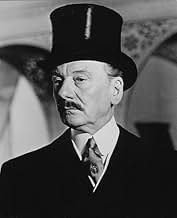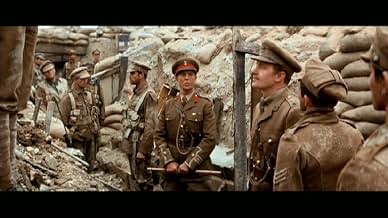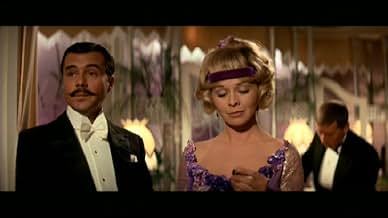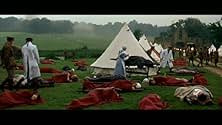Aggiungi una trama nella tua linguaThe working-class Smiths change their initially sunny views on World War I after the three boys of the family witness the harsh reality of trench warfare.The working-class Smiths change their initially sunny views on World War I after the three boys of the family witness the harsh reality of trench warfare.The working-class Smiths change their initially sunny views on World War I after the three boys of the family witness the harsh reality of trench warfare.
- Regia
- Sceneggiatura
- Star
- Ha vinto 6 BAFTA Award
- 8 vittorie e 8 candidature totali
Recensioni in evidenza
The opening sequence, set in a wrought-iron Nowhere, tries to explain the diplomatic chicanery which (allegedly) caused the Great War. This passage is dull, unnatural, garbled and much too long. It does not harmonise with the rest of the story, and the film would have been better without it. Of the cavalcade of ageing English thespians which populates this sequence, only Jack Hawkins as the profoundly melancholic Austrian emperor is at all memorable.
1914 was the season of optimism, shown here by the cheerful seaside scene and the first Battle of Mons, both flooded in pleasant sunshine. When the casulaties start to mount, a shocked theatre audience is rallied by a rousing rendition of "Are We Downhearted? No!", a song which expresses something deep in the English psyche: "While we have Jack upon the sea/And Tommy on the land/We needn't fret".
The government's cynical drive to recruit a volunteer army by 'milking' the simple patriotism of the people is superbly satirised in the 'Roedean' section. Pretty girls onstage sing "We Don't Want To Lose You, But We Think You Ought To Go", and once the young men in the audience are suitably softened up, Maggie Smith lures them into taking the King's Shilling by enticing them sexually.
Class divisions are emphasised. Wounded men from the lower ranks have to wait for treatment, but officers have taxis laid on to take them to hospital. The War forces an aristocrat to converse with one of his retainers, but the conversation is hollow and awkward, as if the men speak different languages. The working-class men in the trenches fraternise with their German 'brothers', and a staff officer in the comfort and safety of England punishes them for their inappropriate behaviour. The pacifist who addresses the workers falls foul of their instinctive patriotism, and doesn't help herself by referring to her audience as "You misguided masses".
The film has many delicious ironic touches. A wounded man arrives back in England, relieved to be out of the hell of war, and is told by a nurse, "Don't worry - we'll soon have you back at the Front". Upper-class war dodgers carry on as before, but they think they are making noble sacrifices - "I'm not using my German wine - not while the War's on". The staff officer who visits the Front is patently unfamiliar with life there, and desperate to get away, but happy enough to have the men live (and die) in these conditions.
By 1915, the optimism has died. The parade of wounded men is a sea of grim, hopeless faces. Black humour has now replaced the enthusiasm of the early days. "There's A Long, Long Trail A-Winding" captures the new mood of despair, and the scene with the tommies filing along in torrential rain is powerfully evocative. Poppies provide the only colour.
We see English soldiers drinking in an estaminet. The chanteuse (Pia Colombo) leads them in a jolly chorus of "The Moon Shines Bright On Charlie Chaplin", a reworking of an American song, then shifts the mood dramatically by singing "Adieu la vie", a truly great tragic song.
The Australian troops have an easy, informal approach to discipline. They make fun of the 'proper' English reserves who are replacing them on the battlefield, and the contrast between the two cultures is depicted by the stiffness of the English drill compared with the sprawling comfort of the Aussies. Naturally enough, the Australians deride the staff officers who arrive to inspect the reserves.
Another passage in the film which simply doesn't work is the religious service in the ruined abbey. Its purpose is to point out the hypocrisy of the great religions, which all came out in favour of the War, but the scene drags horribly and slackens the film's otherwise brisk pace.
1916 passes, and the film's tone darkens appreciably. Now the songs have a wistful quality, laced with the chirpy stoicism of the British soldier - "The Bells Of Hell", "If The Sergeant Steals Your Rum, Never Mind" and "Hanging On The Old Barbed Wire". The trench scenes are terrific, powerfully evoking the squalour of the Front. The wounded are laid out in ranks at the field station, a mockery of the healthy rows of young men who entered the War. Harry Smith's silently-suffering face is one of the film's great images.
The War is drawing to its close, but still the ironies are piling up. The Americans arrive, singing (in travesty of Cohan) "And we won't come back - we'll be buried over there!" Freddy notices with disgust that after three years of this nightmare, he is literally back where he started, fighting at Mons.
As the Armistice is sounding, Freddy is the last one to die. The film closes with a truly stunning aerial view of soldiers' graves, dizzying in their geometry and scale, as the voices of the dead sing, "We'll Never Tell Them". It brought a tear to this reviewer's eye.
The central characters are the Smith family - several sons and nephews, a grandad, mother, wives and younger children. All have tickets for the game, welcomed in at Douglas Haig's booth (Haig puts his own words to 'I do like to be beside the seaside' = 'I do love to see a man in khaki'). They are the routes by which we follow the various battles and conflicts through the war, punctuated by a soundtrack of popular songs of the period ('It's a Long Way to Tipperary', 'Keep The Home Fires Burning', 'and so on).
Oh! What a Lovely War manages to be daring, funny, and moving, and boasts a starry set of cameos including Olivier, Gielgud, Richardson, Maggie Smith, Dirk Bogarde, Kenneth More, Ian Holm, and Vanessa Redgrave. It covers all of the conflict, from the assassination of the Archduke of Austria, through to the Christmas truce in the trenches, to the war's conclusion. Poppies play their part, as well they might, to indicate the scale of loss of life; and a final tracking shot on the Sussex Downs attempts to give some indication of the wanton destruction of 'cannon fodder' by the powers-that-be.
As a pure war film, this would never work. As a satirical musical, it stands up extremely well, and has many memorable moments to reward the viewer when they see the film again and again. Attenborough himself of course would go on to greater things, culminating in the Oscar-winning Gandhi some 13 years later, but this is an excellent debut, sure of itself and without getting bogged down in cloying sentimentality.
It is all the more telling for its simplicity - none of the many great actors taking part delivers a weighty pronouncement on the evils - or otherwise - of war; it is enough to see the awful toll posted on the cricket scoreboard that keeps the daily tally of dead. The ordinariness of the Smith family, who lose every last one of their young men to the conflict, the cheerful patriotism of the proud families waving their loved ones off to war, and the stupid banalities of the officers who daily send their men out to be killed only serve to highlight the absolute futility and waste of WWI and all the wars that followed.
Scenes of upper class twits at play while their servants are dying to preserve their privileges; the officers' ball where military leaders try to score points off each other, concerned only with protocol and promotion; and the brilliant black humor of the outdoor church service are juxtaposed with scenes from the trenches as we watch the young men die one by one, all the more harrowing for their cheeky humor and fatalism.
Why this brilliant film has been allowed to sink without trace is baffling; I first saw it in the early seventies, and today it still has the same impact. And sadly, it is just as relevant now as it was then - a testimony to our inability to learn from our mistakes.
Lo sapevi?
- QuizThe song "La Chanson de Craonne" ("Adieu la Vie"), sung by Pia Colombo (Estaminet Singer) in this movie, commemorates a mutiny in 1917 by French troops. Merely singing it was considered an act of mutiny, and it was banned in France until 1974. During the war, a reward of one million francs and immediate honorable release from the Army was offered for the identity of the author, but never claimed.
- BlooperSir Edward Grey (Ralph Richardson) is shown early in the film being accompanied by his wife, described in the credits as Lady Pamela Grey. In fact, Grey did not marry Pamela (nee Wyndham, and the widow of Lord Glenconer) until 1922.
- Citazioni
Soldier Singer: It was Christmas Day in the cookhouse, the happiest time of the year, Men's hearts were full of gladness and their bellies full of beer, When up popped Private Shorthouse, his face as bold as brass, He said We don't want your Christmas pudding, you can stick it up your... tidings of co-omfort and joy, comfort and joy, o-oh ti-idings of co-omfort and joy. It was Christmas Day in the harem, the eunuchs were standing 'round, And hundreds of beautiful women were stretched out on the ground, Along came the big bad Sultan, and gazed on his marble halls, He said Whaddya want for Christmas boys, and the eunuchs answered... tidings of co-omfort and joy, comfort and joy, o-oh ti-idings of comfort and joy.
- Curiosità sui creditiOpening credits prologue: The principal statements made by the historical characters in this film are based on documentary evidence and the words of the songs are those sung by the troops during the First World War
- ConnessioniFeatured in Love Tory: A Film Portrait of Alan Clark (1993)
- Colonne sonoreOh, It's a Lovely War
(uncredited)
Written by John Long and Maurice Scott
Performed by John Mills and chorus
I più visti
- How long is Oh! What a Lovely War?Powered by Alexa
Dettagli
- Data di uscita
- Paese di origine
- Lingue
- Celebre anche come
- Oh! What a Lovely War
- Luoghi delle riprese
- Azienda produttrice
- Vedi altri crediti dell’azienda su IMDbPro
Botteghino
- Lordo Stati Uniti e Canada
- 801.591 USD
Contribuisci a questa pagina

































